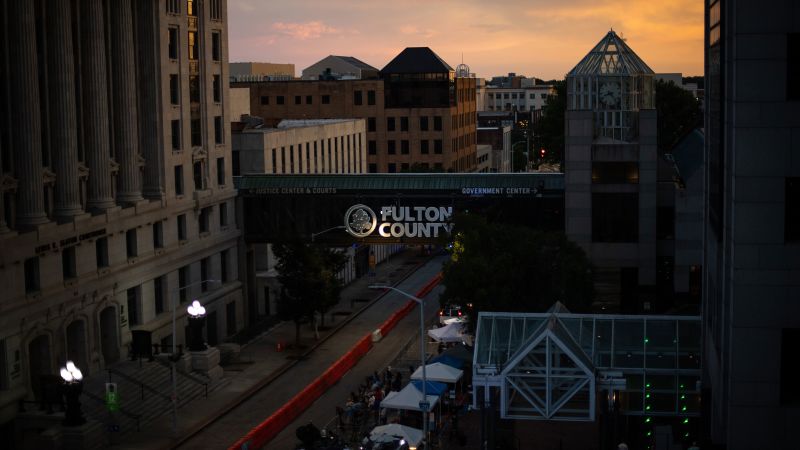CNN
—
The Fulton County special purpose grand jury investigating former President Donald Trump’s efforts to overturn his 2020 election loss in Georgia recommended charges against 39 people, the unredacted grand jury report made public Friday shows.
Fulton County District Attorney Fani Willis, who had the ultimate charging authority, indicted 19 people, including Trump, alleging a conspiracy to subvert the election results. They have all pleaded not guilty.
Reports from special purpose grand juries are rarely made public, but the decision by a judge to do so here reflects the national interest and seriousness of the investigation. No wrongdoing has been accused against those not charged.
Here’s what to know:
The list of those recommended for charges is widespread: It includes a sitting US senator, South Carolina Republican Lindsey Graham; two former US senators from Georgia, David Perdue and Kelly Loeffler; former Trump national security adviser Michael Flynn, Trump adviser Boris Epshteyn; and pro-Trump attorney Cleta Mitchell.
The lengthy list of recommended charges underscores how widespread the special grand jury’s investigation was into efforts to overturn the 2020 election. Essentially acting as a fact-finding group, jurors heard from 75 witnesses overall and examined all levels of the effort to overturn the election results: Trump’s role, his lawyers, the fake electors in Georgia, and lawmakers.
The indictment also included 30 unindicted co-conspirators alleged to have taken part in the conspiracy, including some people the special grand jury recommended charges against.
Trump attacked the report on his social media account Friday, saying: “Essentially, they wanted to indict anybody who happened to be breathing at the time.”
Willis’ indictment of 19 people on racketeering charges laid out a sprawling case against Trump and his co-defendants. But the special grand jury report makes clear that Willis had the option to ensnare even more people in her conspiracy charges had she chosen to do so.
The special grand jury report was only a recommendation, and the district attorney decided which charges to bring to a grand jury last month before the indictment was returned.
The report doesn’t include details about what evidence was considered in making the recommendations, but it does show several places where the vote wasn’t unanimous, suggesting those charges might have been difficult to prove in court.
Willis declined to comment on the report’s release.
The charges recommended against Graham, Loeffler and Perdue as part of the broader racketeering conspiracy and “national effort to overturn the 2020 presidential election,” though it did not return a unanimous vote against any of the lawmakers.
No charges were brought.
After the 2020 election, Graham repeatedly prodded Georgia Secretary of State Brad Raffensperger and his colleagues on the phone about signature-matching of ballots in the Atlanta area. Raffensperger told CNN in November 2020 that he believed Graham “implied” that he should try to “throw out’ some ballots in the heavily Democratic area.
At the time, Graham told CNN that Raffensperger’s characterization of the call was “ridiculous.” Graham argued in a legal fight over testifying to the special grand jury that his calls to state officials were activity related to his responsibilities as then-chairman of the Senate Judiciary Committee. He also argued that his actions should be protected by the Constitution’s Speech or Debate Clause.
Graham defended making phone calls to Georgia election officials on Friday, saying he “had questions” and that it would be “irresponsible” as chairman of the Judiciary Committee not to ask them.
“This is troubling for the country. We can’t criminalize senators doing their job when they have a constitutional requirement to fulfill,” he said to reporters at a South Carolina event. “It would be irresponsible for me in my opinion as chairman of the committee not to try to find out what happened. It’d be irresponsible for me to tell the voters of South Carolina what I did without actually trying to find out what the right answer was.”
Loeffler and Perdue, who were both in the midst of Senate run-off elections in November and December 2020, both attended a meeting with Georgia Gov. Brian Kemp about convening a special session of the state legislature to help Trump’s quest to overturn the election.
One of the jurors voted to exclude former Perdue and Loeffler from the sprawling racketeering charge because the politicians were “pandering to their political base,” according to a footnote in the report.
The special grand jury recommended charging 13 of the 16 people who served as fake electors for Trump in Georgia, though only three were ultimately indicted.
Multiple fake electors cooperated with Willis’ investigation and accepted immunity deals, which explains why some didn’t face charges.
The charges against the fake electors were among the most contested in the special grand jury report. The vote on one potential felony charge was 9-9 with three abstentions for 10 of the alternate fake electors. The special grand jury recommended charges against fake elector and now-Lt. Gov. Burt Jones by a 10-8 vote, also with three abstentions.
A judge barred Wills from pursuing a case against Jones after she attended a fundraiser for his political opponent last year. Pete Skandalakis, the Executive Director of the Prosecuting Attorneys Council of Georgia, said last month a special prosecutor would investigate Jones’ role. Jones was one of the 30 accused co-conspirators not included in the final indictment.
Two of the grand jurors voted against recommending indicting the fake electors “for doing what they were misled to understand as their civic duty,” the report says.
The three fake electors who were charged – David Shafer, Cathy Latham and Georgia state Sen. Shawn Still – have pleaded not guilty. All three have filed motions to move their cases to federal court, arguing they were following the advice of the then-president’s attorneys.

